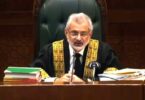F.P. Report
ISLAMABAD: The Pakistan Tehreek-e-Insaf has submitted a review petition once again against the verdict in the Faizabad sit-in case, on Tuesday.
According to local news channel report, In February, the Supreme Court had issued a written verdict on a suo motu case of the sit-in staged by the Tehreek-e-Labbaik Pakistan (TLP) at Faizabad Interchange in 2017 and ordered the state to prosecute those advocating hate, extremism and terrorism.
Few days ago, the PTI had submitted a review petition, alleging misconduct from Justice Qazi Faez Esa, which was returned from the registrar office on the basis of objections.
This time, the PTI has amended the allegations of misconduct against the apex court judge.
According to the plea, the verdict gave observations on the PTI sit-in and the party was not given a chance to present its side of story.
It further pleaded that the observations against the PTI should be removed.
Meanwhile, the Election Commission of Pakistan has also submitted a review petition against the case’s verdict after removing objections.
In November 2017, the top court had taken suo motu notice of the three-week long sit-in, which was held against a change in the finality-of-Prophethood oath, termed by the government as a clerical error, when the government passed the Elections Act 2017. The sit-in was called off after the protesters reached an agreement with the government.
On Nov 22, 2018 a two-judge bench of the apex court comprising Justice Qazi Faez Isa and Justice Musheer Alam had reserved their judgement on the case.
The 43-page verdict issued by the two-judge bench and published on the apex court’s website today read, “Every citizen and political party has the right to assemble and protest provided such assembly and protest is peaceful and complies with the law imposing reasonable restrictions in the interest of public order. The right to assemble and protest is circumscribed only to the extent that it infringes on the fundamental rights of others, including their right to free movement and to hold and enjoy property.”






